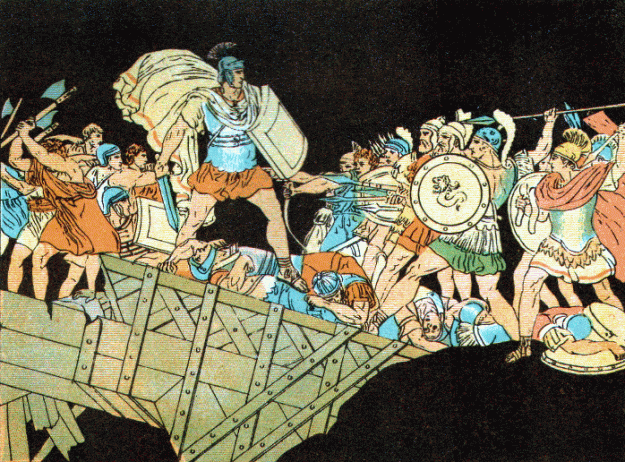
Macaulay’s ‘Lays of Ancient Rome’ are remarkable in several ways. The well-known ‘Horatius’ (aka ‘Horatius at the Bridge’) is glorious, memorable, stirring, heroic, in lovely rolling ballad-type stanzas:
Then up spake brave Horatius,
The Captain of the Gate:
“To every man upon this earth
Death cometh soon or late.
And how can man die better
Than facing fearful odds,
For the ashes of his fathers,
And the temples of his gods?”
Great stuff! It seems in keeping that Winston Churchill (love him or loathe him) would have learnt all 70 stanzas as a schoolboy, inspiring himself to develop courage (and oratory).
But the second remarkable thing is how bad the rest of the material in the volume is. The poetry is uninteresting, and the pure heroism of ‘Horatius’ is replaced either by gods winning the human battle, or by a girl being ‘saved’ from being despoiled by a tyrant by her father killing her when the three are together in the Forum (and not attempting to kill the tyrant), or by the poems deteriorating into blathery fragments.
Macaulay was wordy from an early age. The story is told of him that, uninterested in toys, he was reading avidly by the age of three and he already talked like a book. When hot coffee was accidentally spilled on his legs and a kindly woman asked “Is Diddums all right?” he replied, “Thank you, madam, the agony is abated.”
The third way in which this volume is remarkable is in the main Preface and in the shorter prefaces to each of the poems, especially ‘Horatius’. Here Macaulay lectures in detail on a perceived universal process of ballad creation in preliterate societies (and on the value of verse for memorisation), ballads’ subsequent devaluation when higher standards of literacy come in, and finally their total loss or partial recovery. He recounts the differences between two ballads of the Battle of Otterburn which have quite different outcomes for the protagonists, even though both ballads were probably written by people who were alive at the time of the battle.
And in a throw-away paragraph he inadvertently highlights the changes in education and culture that have taken place in the past 150 years: “The early history of Rome is indeed far more poetical than anything else in Latin literature. The loves of the Vestal and the God of War, the cradle laid among the reeds of Tiber, the fig-tree, the she-wolf, the shepherd’s cabin” (to these five he adds a further 23 examples, ending with) “the combat between Valerius Corvus and the gigantic Gaul, are among the many instances which will at once suggest themselves to every reader.”
As if! Well, that was then, this is now. But ‘Horatius’ itself has a timeless quality to it. Although if you are trying to invoke heroism by reading it to a 10-year-old which I strongly recommend, you should pre-read it and comfortably skip some of the unnecessary early verses.
